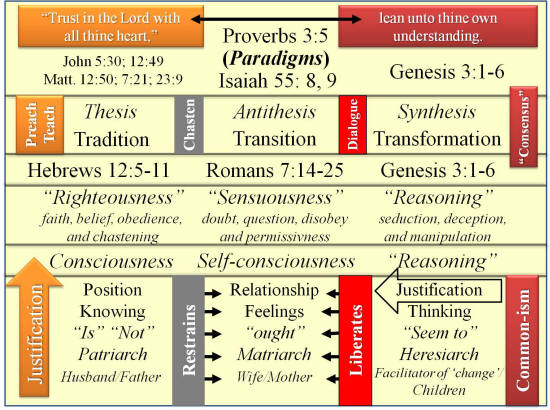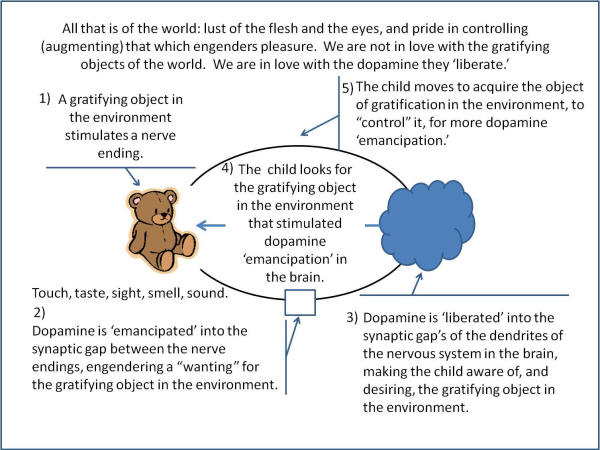
Presentation class outline
The Dialectic Process put into Praxis.
Dialectic 'reasoning' negates the father's authority in the child's feelings, thoughts, and actions and in his relationship with other children negating the Father's (God's) authority in man's feelings, thoughts, and actions, and in his relationship with other men in the process. "The philosopher Hegel said that truth is not found in the thesis nor the antithesis but in an emerging synthesis which reconciles the two." (Martin Luther King Jr., Strength to Love) In dialectic 'reasoning' reconciliation is not between man and God but between mankind himself, negating God's authority over man in the process.
The dialectic formula: Thesis, Antithesis, and Synthesis.
If Thesis is the father's authority then Antithesis is the tension between the father's authority and the child's feelings of the 'moment.' Because of the father's authority to chasten the child (for disobedience) or cast him out (for disrespecting his authority, i.e. for questioning his rules, commands, facts, and truth and challenging his authority), Synthesis (the child becoming "at-one-with" himself and the world) can not become actualized, i.e. can not become a reality. Only by starting with the child's "feelings" and "thoughts" of the 'moment,' i.e. beginning with the child's opinion, making the child's desires the Thesis, i.e. making the father's authority the Antithesis (the source of tension) can the child ('justifying' himself), negate in his feelings, thoughts, and actions and in his relationship with others the father's authority, creating Synthesis (unity with himself and the world) in the process. Since Synthesis does not happen naturally, facilitators of 'change must seduce, deceive, and manipulate those who are dissatisfied with the father's/Father's authority into building relationship with one another over and against the father's/Father's authority, 'creating' a "new' world order of children (in adult bodies) 'liberating' the world from Godly restraint. It is a formula that has worked down through the ages, now being applied on a global scale.
Human Nature:
Our nervous system (touch, taste, sight, smell, sound) is stimulated by objects in the environment. Our coming into contact with an object in the environment 'liberates' ('emancipates') chemicals (called neurotransmitters) between nerve endings in the body (called synaptic gaps—not only on the way to the brain but in the brain itself). When dopamine, the neurotransmitter of pleasure, is emancipated into the synaptic gaps in our brain we become aware of a gratifying object in the environment. Because of our bodies natural "want" (desire, i.e. "lust") for dopamine emancipation, we look into the environment to locate the gratifying object which stimulated it. We then take action (move in the direction of the gratifying object) to apprehend it in an effort to simulate more dopamine emancipation, i.e. to have more pleasure. The child is not in love with the toy he is playing with. He is in love with the dopamine which is being 'liberated' into the synaptic gap, which the toy is stimulating. It is our carnal nature ("human nature") to approach pleasure and to avoid pain.
"Self" loves dopamine. If we can not have the object of gratification which stimulates dopamine 'emancipation', we imagine it, i.e. we daydream instead, 'creating' a world of gratifying objects in our mind, stimulating dopamine emancipation in the process (imagining the world as it "ought" to be). The thoughts of a child, left to himself, will create a world of pleasure, esteeming, exalting, 'justifying' his "self," i.e. his love of dopamine 'emancipation,' i.e. his love of pleasure in the process. According to dialectic 'reasoning,' it is the father's authority which inhibits or blocks the child's world of pleasure, engendering a world of pain (the absence of or missing out on pleasure can be perceived as pain), teaching the child to humble, deny, control, discipline his "self" instead. Finding pleasure in pleasing the father, i.e. a "substitute gratification" (Freud) or an "opiate" (Marx), i.e. the restrainer of pleasure, is therefore, according to dialectic 'reasoning,' the cause of "neurosis," "repression," and "alienation," where a persons belief conflicts with that which is of nature.
Paradigms: Patriarch, Matriarch, Heresiarch (Knowing, Feeling, Thinking)
The Patriarchal Paradigm is the father's/Father's "above-below," "top-down," "right-wrong" authority system: 1) to preach and teach commands and rules to be obeyed and facts and truth to be accepted as is (by faith), 2) to bless (reward) those children who obey or do things right, 3) to chasten those children who disobey or do things wrong (to restore them to his/His authority and to do things right), and 4) to cast out those children who disrespect his/His authority, i.e. who question his commands, rules, facts, and truth and challenge his/His authority. In this paradigm the child knows "Because dad said so." the student knows "Because the teacher said so." As Jesus said: "It is written....," knowing the truth because God revealed it by His Word.
The Matriarchal Paradigm is the mother's heart, desiring peace and harmony, i.e. "feelings" driven, caught between her husband's authority (the children's father's authority) and the children's feelings of the 'moment,' with the child, while "lusting" after dopamine emancipation, still having a "guilty conscience" for disobedience.
The Heresiarchal Paradigm of 'change' is the children 'justifying' themselves with one another ("thinking" according to their "feelings" of the 'moment'), i.e. augmenting pleasure, i.e. 'liberating' dopamine 'emancipation,' and attenuating pain, i.e. negating the father's/Father's authority which blocks or restraints it. The role (duty) of the facilitator of 'change,' i.e. "the child of disobedience" is to "help" children "think through their feelings," i.e. to evaluate themselves and the world around them from their "feelings" instead of from the father's/Father's rules, commands, facts and truth. Through the praxis of 1) "unfreezing" the child, i.e. creating for the child a "safe zone," i.e. an "experiential environment" in which he can openly share his opinion, i.e. express his "feelings" and "thoughts" of the 'moment' without fear of reprisal (without fear of being chastened or cast out) so that he can dialogue with other children his "feelings" (love) for pleasure and his "feelings" (resentment/hate) toward parental authority which blocks or inhibits it, 2) "moving" or 'changing' the child's loyalty to his parents (who disapprove of his "lusting" after pleasure and chasten him for disobeying their commands and rules and questioning their facts and truth) to "the group" instead (which approves of his "lusting" after pleasures and his resentment toward parental authority), and 3) "refreezing" the child, through the child coming to a consensus (synthesis, i.e. to a "feeling" of "oneness" or agreement) with other children, working together as a "group," on a "group project," i.e. augmenting pleasure and attenuation pain, i.e. feeling, thinking, and acting and relating with one another as "one." 'Liberated' from the father's authority they are able (and willing) to 'liberate' the world from the Father's authority, i.e. from Godly restraint. "Knowing" it is 'true' (right) because it "feels" "good."
Proverbs 3:5, 6; Isaiah 55:8, 9; John 3:30; 12: 49; Matt.23:9; 12:50; 7:21; 2 Corinthians 10:4; Hebrews 12:5-11; Romans 7:14-25; Genesis 3:1-6; 1 John 2:15-18; Luke 16:15; Romans 1:18; Ephesians 5:6


Adorno: "God is conceived more directly after a parental image and thus as a source of support and as a guiding and sometimes punishing authority." (Theodor Adorno, The Authoritarian Personality)
Hegel: "The child, contrary to appearance, is the absolute, the rationality; he is what is enduring and everlasting, the totality which produces itself once again as such [once 'liberated' from the father's authority]." (George Hegel, System of Ethical Life)
Marx: "Once the earthly family is discovered to be the secret of the holy family, the former must itself be annihilated [vernichtet] theoretically and practically." (Karl Marx, Theses On Feuerbach #4) "The life [authority] which he [the child] has given to the object [to the Father] sets itself against him as an alien and hostile force." (Karl Marx, MEGA I/3) "Tillich suggests that it would be better to let the giver of arbitrary laws [God, the Father] to destroy us physically than to accept the psychological destruction that would accompany submission to an alien will." (Leonard F. Wheat, Paul Tillich's Dialectical Humanism)
Freud: "'It is not really a decisive matter whether one has killed one's father or abstained from the deed,' if the function of the conflict and its consequences are the same." (Sigmund Freud in Herbert Marcuse, Eros and Civilization)
Lewin: "The negative valence of a forbidden object which in itself attracts the child thus usually derives from an induced field of force of an adult." "If this field of force loses its psychological existence for the child (e.g., if the adult goes away or loses his authority) the negative valence also disappears." (Kurt Lewin; A Dynamic Theory of Personality) To negate the "guilty conscience" you must get the father's authority out of the room. Once you get the father's authority out of the room you can 'liberate' the child's "feelings" and "thoughts," negating the "guilty conscience." "It is usually easier to change individuals formed into a group than to change any one of them separately." "The individual accepts the new system of values and beliefs by accepting belongingness to the group." (Kurt Lewin in Kenneth Benne, Human Relations in Curriculum Change) "Kurt Lewin emphasized that the child takes on the characteristic behavior of the group in which he is placed. . . . he reflects the behavior patterns which are set by the adult leader of the group." (Wilbur Brookover, A Sociology of Education)
Benjamin Bloom, et al., Taxonomy of Educational Objectives, Book 1, Cognitive Domain: "a psychological classification system." "We recognize the point of view that truth and knowledge are only relative and that there are no hard and fast truths which exist for all time and places." ("In the eyes of the dialectical philosophy, nothing is established for all time, nothing is absolute or sacred." Karl Marx)
David Krathwohl, Benjamin Bloom, etc. Taxonomy of Educational Objective Book 2 Affective Domain: "In fact, a large part of what we call 'good teaching' is the teacher's ability to attain affective objectives through challenging the student's fixed beliefs and getting them to discuss issues." "The major impact of the new program is to develop attitudes and values toward learning which are not shared by the parents." "There are many stores of the conflict and tension that these new practices are producing between parents and children." "The affective domain is, in retrospect, a virtual 'Pandora's Box [a box full of evils, which, once opened, can not be closed]." Bloom's world view, i.e. his "Weltanschauung" is that of two Marxists: "Cf. Erich Fromm (Escape from Freedom), 1941; T. W. Adorno et al., (The Authoritarian Personality), 1950."
Fromm wrote: "In the process of history man gives birth to himself. He becomes what he potentially is, and he attains what the serpent―the symbol of wisdom and rebellion―promised, and what the patriarchal, jealous God of Adam did not wish: that man would become like God himself." (Erick Fromm, You shall be as gods)
Adorno wrote: "We must using social environmental forces to change the parent's behavior toward the child." (The Authoritarian Personality) When the father is pressured to establishes his authority upon the child's "feelings," he abdicates (losses) his authority to the child's "feelings." "Once the parent can in any way imagine his own orientation to be a possible liability to the child in the world approaching the authoritarian family is moribund, regardless of whatever countermeasures may be taken." (Warren Bennis, The Temporary Society)
The dialectic process negates private family, property, and business (private convictions-conscience): "On account of the absolute and natural oneness of the husband, the wife, and the child, ... the surplus is not the property of one of them ... all contracts regarding property or service and the like fall away ... the surplus, labour, and property are absolutely common to all, inherently and explicitly." (Hegel, System)
© Institution for Authority Research, Dean Gotcher 2015